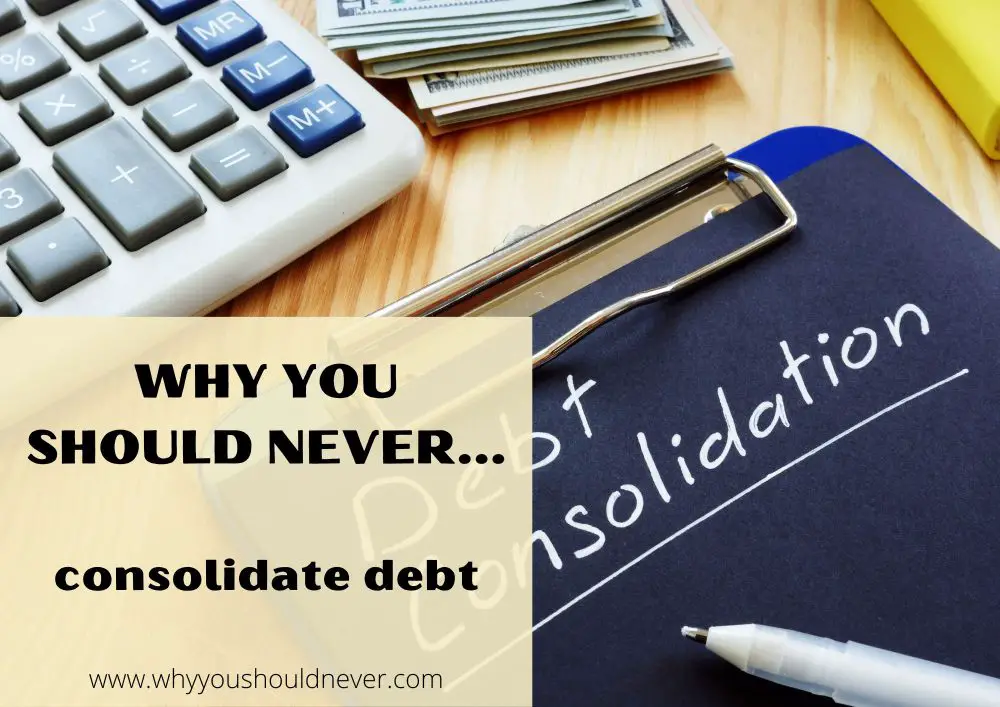![]()
Why You Should Never Consolidate Debt
Debt consolidation is often presented as a magical solution to all of your financial struggles. The idea is simple: you take out a loan to pay off all your other debts, leaving you with one monthly payment instead of multiple ones.
Sounds great, right? Well, not so fast!
Although many people find debt consolidation to be a helpful tool, it’s not the right choice for everyone. In fact, it could very well make your financial situation worse. Let’s explore why that is below.
7 reasons why you shouldn’t consolidate debt
1. You’ll end up paying more in interest
When you consolidate your debt, you’re essentially taking out a new loan with a new interest rate. And more often than not, that interest rate is higher than what you were paying on your original debts.
So even though you’ll have a lower monthly payment, you’ll end up paying more in interest over the life of the loan.
2. You might end up in even more debt
Consolidating your debt doesn’t actually get rid of it. All you’re doing is moving it around. And if you’re not careful, you could end up accumulating even more debt on top of what you already owe.
After all, if you’re suddenly freed up from making multiple debt payments every month, you might be tempted to start spending more money on other things.
3. You could be putting your assets at risk
Many debt consolidation loans are secured loans, which means they require collateral such as your home or car to be used as security. If you can’t make your payments, the lender has the right to seize your assets.
This puts you at risk of losing your home or car if you fall behind on your payments. And if you’re already struggling with debt, the last thing you need is the added stress of potentially losing your most valuable possessions.
4. Debt consolidation can hurt your credit score
When you take out a debt consolidation loan, it shows up as a new account on your credit report. This can temporarily lower your credit score, as it looks like you’ve taken on new debt.
Additionally, if you close out your old credit card accounts after consolidating your debt, it could hurt your credit score even more. This is because it reduces your overall available credit, which can increase your credit utilization ratio (the amount of credit you’re using compared to the amount you have available).
5. You might not qualify for a good interest rate
Even if you do decide to consolidate your debt, there’s no guarantee that you’ll be able to get a good interest rate.
If your credit score is low or you have a high amount of debt, lenders might see you as a risky borrower and assign you a higher interest rate. This can end up costing you even more money in the long run.
6. It doesn’t address the root of your debt problem
The reality is, though you might lower your monthly payments to make them more manageable, debt consolidation doesn’t actually solve the root of your debt problem. If you’re struggling with debt because of overspending or poor financial habits, consolidating your debt won’t help you change those behaviors.
To truly get out of debt, you need to address the underlying issues that caused the debt in the first place. This might mean creating a budget, finding ways to increase your income, or seeking help from a financial advisor.
7. You might be better off pursuing other options
Debt consolidation isn’t the only option when it comes to managing your debt. There are other strategies you can pursue that might be more effective and less risky.
For example, you could try negotiating with your creditors to lower your interest rates or settle your debts for a lesser amount. You could also consider debt management or debt settlement programs, which can help you pay off your debts more efficiently.
And in some cases, filing for bankruptcy might be the best option. Though it should be a last resort and has its own set of consequences, bankruptcy can provide relief from overwhelming debt and give you a fresh start.
All in all, debt consolidation might seem like an easy answer to your debt problems, but it’s not a one-size-fits-all solution. There are plenty of risks and downsides to consider before you decide to take this route.
At the end of the day, the best way to get out of debt is to address the root of the problem and create a plan that works for you. Whether that means consolidating your debt, pursuing other options, or seeking help from a professional, the most important thing is to take action and start making progress towards a debt-free life.
